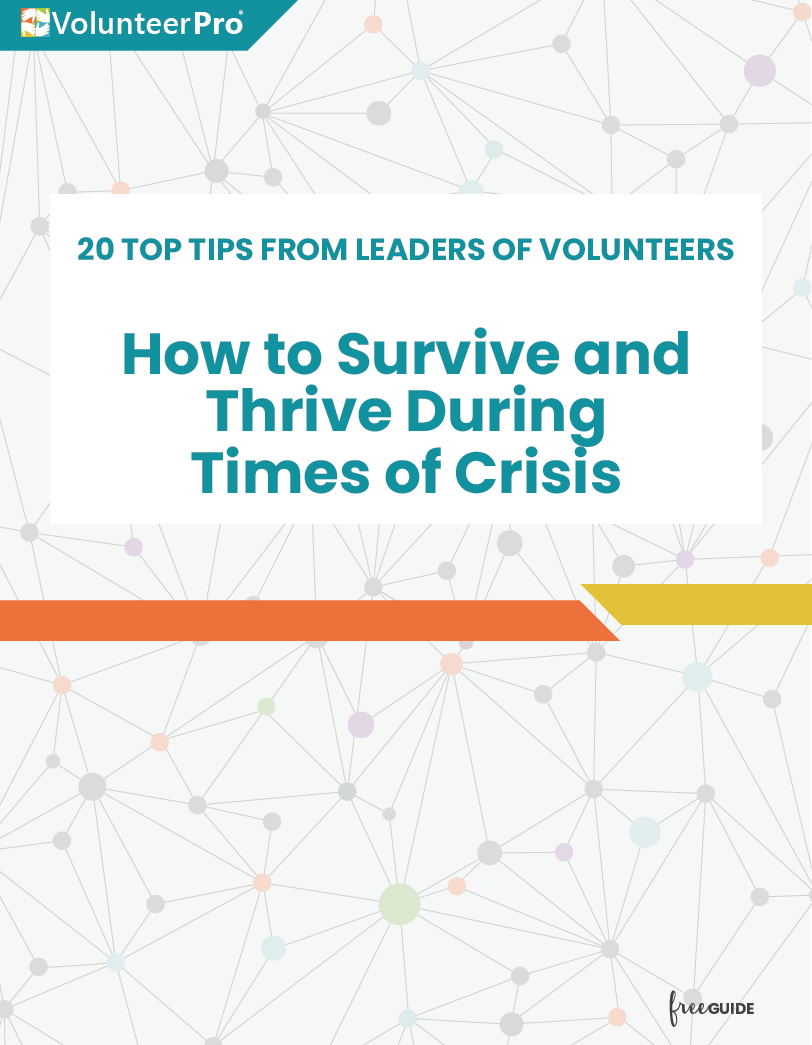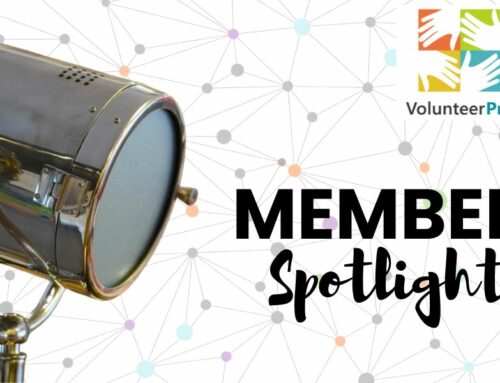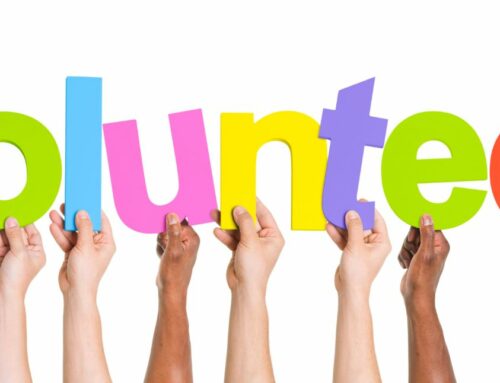 How to Talk About Race & Volunteerism:
How to Talk About Race & Volunteerism:
Advice for Allies
Over the past five years of Volunteer Management Progress Report surveys, we’ve cataloged an ever-present reality of the field of volunteer management – that our pool of professionals (at least here in the United States) is comprised primarily of White, educated women.
This often prompts me to then ask – “Do we have a diversity problem?”
More specifically, I note the following in the 2020 Report …
“Respondents continue to be White (84%) women (87%). This trend has continued for five years. This represents less diversity than in the nonprofit sector as a whole. As a point of comparison, some report that 75% of sector employees are women, and while people of color are roughly 40 percent of the U.S. population, only 18 percent of nonprofit employees are people of color, a slightly higher percentage of those who work in volunteerism. While the field continues to be multi-generational, the field is becoming younger over time as professionals age out.
While we have realized modest gains in our overall diversity as a field, it will be important to track this trend. Does a lack of diversity affect who becomes a volunteer? And, does it affect which volunteers discover opportunities, thus reinforcing a cycle of sameness?”
In addition to the lack of diversity in leaders of volunteers, there is also a lack of diversity in volunteers here in the United States.
The most recent statistical data on volunteers in the US shows that Whites continued to volunteer at a higher rate (26.4 percent) than Blacks (19.3 percent), Asians (17.9 percent), and Hispanics (15.5 percent). This volunteer rate has shown little or no change for all when it comes to race and ethnicity groups.
And, while some may argue that the data is skewed because people from different backgrounds define “volunteerism” differently, there is plenty of anecdotal evidence to the contrary.
There is plenty of discussion both inside the VolunteerPro community and elsewhere about how to build a more diverse volunteer base that better reflects the communities served. And, this has been a persistent issue. I remember grappling with it myself as the director of a large statewide volunteer program and it is something that has persisted.
There is also data that shows that people of color working in nonprofit environments experience bias and racism in both subtle and overt ways. There is also research that shows how the self-reinforcing cycle of bias perpetuates a White majority staff structure.
But, does this translate to volunteers, as well?
A 2020 study by Dr. Helen Timbrell called “What the bloody hell are you doing here? A comparative study of the experiences of Black, Asian and Minority Ethnic and White volunteers in four organisations” found “evidence of BAME volunteers experiencing a range of microaggressions and racism when on duty and this came variously from fellow volunteers, organisational staff and members of the public.”
What’s more, the study found that “Some BAME volunteers felt they took up space that White volunteers appeared to feel belonged to them. One way of responding to this was for BAME volunteers to overperform, as a way of demonstrating they were worthy of taking up that space.”
We discuss the report with Dr. Timbrell and one of the study participants in Episode 202 of the Time + Talent Podcast – listen here.
If you dig deeper, you can certainly find more troubling news.
Many nonprofit workers would agree that institutional racism and implicit bias found in society also makes their way into the third sector.
And, when it comes to addressing equitable volunteer inclusion and anti-racist work in volunteerism, many also are at a loss about what to do.
The Ethical Foundation for More Inclusive Volunteering
Recently, we offered a two-part series on diversity, equity, and inclusion in order to begin a frank and productive discussion about race and volunteerism and to give our audience some practical tips.
The response was overwhelmingly positive, but we could see fear and doubt begin to creep in.
If you have begun to think through how you will address issues of race and volunteerism and inequity, you’re not alone. The enormity of the task of reversing past wrongs can feel overwhelming.
The most important step to take is to simply get started.
And, now is a good time to do so.
While leaders of volunteers have called for racial justice in the past, only to have those appeals fall on deaf ears, right now the attention of many nonprofits is rightly attuned to issues of injustice.
And, because it’s not clear if this attention will fade in the future, now is a definitive time to take concrete steps toward more inclusive volunteering.
And, you may be wondering how to get the ball rolling at your agency, more specifically 1) what to say to get the go-ahead and 2) what to say to engage others in the process.
The good news is that, rather than a new requirement for leaders of volunteers, the responsibility for administering fair and just volunteer initiatives is already a globally accepted practice.
The Council for Certification in Volunteer Administration (CCVA) has developed five core values and related principles that ensure volunteer organizations …
- are accessible to diverse groups
- operate ethically with all stakeholders
- strive for excellence
- maintain the public trust
- sustain a helping environment
- are at low risk for legal actions against them
In addition to being accessible to diverse groups, any of the values above can be linked to race equity in volunteerism.
Maintaining public trust relies on the organization’s ability to meet its promise to all communities. The inclusion of diverse volunteers can serve as the foundation for such trust.
Managing for reduced risk of legal action includes lawsuits related to discriminatory volunteer practices.
And, so forth.
One of the CCVA’s key values is that of Fairness. This includes conducting oneself in an unbiased way, ensuring that all have equal access to opportunities and that discrimination and prejudice be rooted out and addressed.
CCVA Core Principle: Fairness
Backed by the authority of the global credentialing agency for the field of volunteer administration, leaders can begin to make the case for more equitable and inclusive practices and the resources needed to support it.
Race & Volunteerism: Taking Action
So, you recognize that your organization needs to remove barriers for volunteers of color.
How do you get the conversation started?
Part of the art of leadership is to craft communications and requests that can be heard.
So, your approach might look different based on where your organization is at in terms of its understanding and awareness around the need for transformative change.
Below are three possible levels of organizational readiness and possible “getting started” scripts to go with each:
- Unaware – “Bias isn’t really an issue here. Our opportunities are open to all.”
Educate – In this case, your goal is to connect the dots between the agency’s mission, vision and values and to build awareness around the strengths of engaging volunteers from all walks of life. If your organization is resistant to taking on anti-racist work, then building a business case for diverse volunteers may get you better traction at the outset.
Script – As the person responsible for engaging volunteer talent, part of my job is to ensure that our volunteer strategy is aligned with our agency’s mission and vision for success. If we stand for [insert a relevant excerpt from vision or mission statement] and our goals are to [insert key agency goal], then we will need a diverse base of volunteers to achieve it. If we are able to welcome volunteers from all walks of life, [insert what this will make possible (e.g., connect to communities we have yet to fully serve)]. Becoming more inclusive will make us stronger as an agency and as a respected community resource. I recommend that [insert your next steps]. What do you think?
- Partially Aware – “We need to diversify our volunteer base to match the community we serve.”
Advocate – In this case, your organization understands on some level that engaging a diverse group of volunteers is optimal, but they don’t necessarily see how their organization perpetuates systemic oppression or that microaggressions against volunteers are likely occurring right under their noses. In this case, continuing to reinforce the power of volunteer diversity is a good start. But you’ll also need to go deeper to unveil hidden truths.
Script – As the person responsible for engaging volunteer talent, part of my job is to ensure that we are a welcoming place for volunteers from all walks of life and that all are treated fairly. I suspect that there may be barriers for volunteers of color and from other marginalized groups. Here’s why: [insert any evidence you have (e.g. volunteer survey results, the research you’ve read, complaints you’ve heard, or simply your volunteer demographics and retention rates)]. I recommend that [insert your next steps]. What do you think?
- Fully Aware – “Implicit bias exists in all organizations, and it is our responsibility to proactively create a just and equitable space for all people to contribute as their authentic and best selves.”
Activate – In this case, your organization has already acknowledged their role and aspirations for helping dismantle racism. Your job at this point is to make the connections between stated principles, specific actions to be taken, and the resources need to carry it off. While it’s easy to get caught up in the moment, it will be harder to maintain the focus on racial justice over the long term. So, it helps if you can map out a plan for volunteers and keep everyone accountable to it.
Script – As the person responsible for engaging volunteer talent, part of my job is to ensure that our volunteer strategy faithfully reflects the values and goals of our organization and to ensure we make the most of the wide array of talent found here in our community. I want to ensure that our anti-racist work is also reflected in how we engage volunteers and that we take a close look at how bias and power work to marginalize in our environment so that we can directly address any inequities. I recommend that [insert your next steps and any resources you will need]. What do you think?
If you are a White ally with little previous experience leading efforts like these, these preliminary requests for consideration and calls to action may bring up fear and self-doubt.
Who am I to advocate for change as a White person? What if I start something that I can’t finish? What if I do more harm than good?
At this point, it may be helpful to remind yourself of your core responsibilities as a leader of volunteers. Ensuring that volunteers have a safe, welcoming place to contribute their time and talent sits directly in your wheelhouse. So does ensuring that a wide range of volunteers have fair access to your opportunities.
In addition to CCVA, the International Association or Volunteer Effort (IAVE), also draws a clear line between volunteer-involving organizations and their responsibility for promoting more inclusive volunteering.
Their Universal Declaration on Volunteering “supports the right of every woman, man and child to associate freely and to volunteer regardless of their cultural and ethnic origin, religion, age, gender, and physical, social or economic condition. All people in the world should have the right to freely offer their time, talent, and energy to others and to their communities through individual and collective action, without expectation of financial reward.”
They also point to the fact that volunteerism itself can be an agent of healing in communities, asserting that “connections can be made across differences that push us apart so that we can live together in healthy, sustainable communities, working together to provide innovative solutions to our shared challenges and to shape our collective destinies.”
To act as a fully aware and involved steward of volunteer contributions, we need to become more aware of our own implicit biases and actively call into question volunteer policies that serve to discriminate, intentionally or otherwise.
There are brave people who are stepping forward and actively promoting change from within.
For inspiration, check out Laura Pilati’s post – “Why I decided to give up complicity in order to be an anti-racist volunteer manager” – in the Community-centric Fundraising blog.
She calls out the power dynamics in agency roles noting that “When we label community members as “volunteer,” “donor,” “client,” or “staff,” we assign them to positions in a hierarchy, with power dynamics, and miss out on the opportunity to engage them more deeply and fully.”
She also inspires us to transform volunteer engagement from the transactional to the community-centric, thus realizing the ultimate aim of volunteerism, to build community.
Challenging Ourselves to Grow
 In my own experience, I’ve working in many nonprofit spaces that are rife with the unexamined use (and abuse) of power, ironic when many missions claim to work for the opposite.
In my own experience, I’ve working in many nonprofit spaces that are rife with the unexamined use (and abuse) of power, ironic when many missions claim to work for the opposite.
I remember working for an organization that printed “overcoming racism by any means necessary” on their paychecks. It was a wonderful intention, but rarely acted upon in real ways with real impact on people. While they promoted “livable wage” statistics and developed programs to help families achieve it in our city, custodial staff were paid minimum wage, far below what was needed to sustain them.
We clearly have work to do. And, now is a good time to start.
With all that’s going on, we can be nothing but blunt about the experiences of so many Americans and how a select few have so richly benefited from the oppression of many.
It’s beyond time to dispense with the niceties of keeping White people comfortable with the status quo inside our nonprofit institutions.
Last week, during our Time + Talent Podcast Season 2 launch party, my co-host Jennifer Bennett of Volunteer Match noted that “simply saying volunteers from all walks of life are welcome, does not automatically make it so.”
So true.
During this season of the podcast, we were able to welcome guests from diverse backgrounds who have much wisdom to share about breaking down barriers and building an equitable volunteer community that matters.
Guests like Brittni Coe, Hadji Singh, and Faiza Venzant offer ideas and inspiration for doing the work, so be sure to check them out as the pod episodes are released this fall.
In closing, as a White leader of volunteers you yourself may also feel disempowered and devalued within your organization. While true, that doesn’t give anyone a pass on doing the right thing.
As White people, our privilege gives us a platform. And, it’s up to us to explore our unexamined power and roles as a gatekeepers.
For our part, here at VolunteerPro we plan to continue to raise questions, offer resources, and amplify diverse voices through our channels so that we can flip the script on power in our sector together.
If you are interested in writing or sharing your experiences, please reach out to me directly at wecare@volpro.net.
Ready for a More Resilient 2021?
Get Tips to Survive and Thrive with Our Free Guide
Looking for a pick-me-up to get you through tough times?
Download our Free Guide and read about how talented volunteer leadership professionals overcome challenges, stay motivated, stay positive and have fun, even when faced with a crisis.
You will leave with 20 tips that will keep you inspired and motivated, giving you the ability to lift your community with you as you focus on what you are here to do: build a thriving support system for your nonprofit!
[FREE GUIDE] 20 Top Tips from Leaders of Volunteers:
How to Survive and Thrive During Times of Crisis
26 pages of inspiration from leaders who walk the talk.
Learn what your peers have to say about the following four themes:
- Overcoming Challenges: You can do Hard Things
- Mindfulness: Good Vibes Only
- Stay Motivated & Do Good Work
- Be Yourself: Have Fun and Make a Difference






